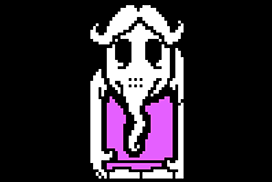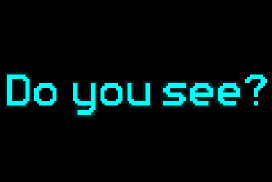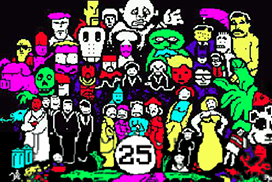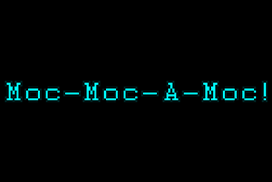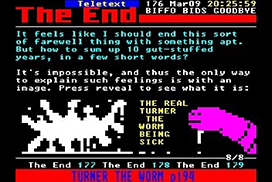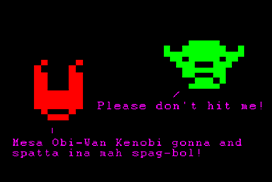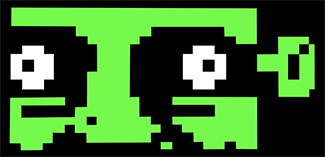
Grumble feature enabled
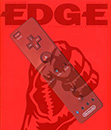
|
Listing badly
Edge #156, December 2005
In the wacky world of journalism, lists are useful things. As I write this, the media is reporting the awfully important news that an important music magazine has published one of those lists of the most important British songs of all time. This time, A Day In The Life is at number one, with Robbie Williams' Angels, Bowie's Life On Mars and Oasis' Wonderwall also spreadeagled lewdly in the top ten. Such lists are, of course, pointless. Music is like cakes: how can you truly argue that the humble Pontefract is the best type of cake when someone else might prefer a cream horn? Titter!
You could punt that accusation between the buttocks of gaming media, which is equally obsessed with best-of lists. The difference with games is that you can make a definitive statement about The Best Game Ever: it's Tetris.
With Tetris, there can be no such difference of opinion, or viewpoint tainted by so-called 'ponce-baggage'. Whomever you are, whatever your background - young, old, rich, poor, stupid, smart, tramp, tart, handsome amputee, or hideous octopus-man - it's not whether or not you like Tetris, it's whether or not you've played it. Tetris crosses boundaries, and unites us all in a way that Half-Life 2 and little Bono could never do. It doesn't discriminate between its players, and consequently nothing can touch it for sheer universal appeal. It simply is the greatest game ever made, no argument. And yet, every attempt to separate it from the Game Boy has failed.
Attempts to make Tetris 'fit' on other consoles have been like using a bread knife to cut gills in a horse's throat so that it'd be at home in your garden pond. Though it existed before the handheld market spurted forth from Nintendo's eerily depleted loins, Game Boy and Tetris - whether by design or accident - were the perfect symbiosis of software and hardware.
What's so depressing about the current generation of handhelds is that games are being ported over from consoles without a great deal of thought as to where they're ending up.
The PSP is lumbered with GTA: Liberty City Stories, Medievil Resurrection and all those ruddy racing games that at best smack of blinkered mentalism, and, at worst, flaccid cynicism. Yes, they play OK - but they're not really handheld games. They lack that quick-burst immediacy you want from the best handheld titles. You look at the forthcoming PSP releases, and it's a surfeit of 3D nonsense. Firstperson shooters, racing games, sports sims, beat 'em ups, RPGs with 'epic, 3D visuals'. All well and good, but I can get all of that on the PS2 or Xbox or GC. If I want to play futuristic hovercraft racing game I don't want to do it on the bus. Developers are taking the easy route, when Sony should be forcing them to make more leaps of faith. The PSP may be a 3D powerhouse, but just because you can do something doesn't mean you should.
The DS fares better - primarily because the touchpad is encouraging developers to utilise it - witness the likes of Nintendogs, Meteos, Wario Ware: Touched!, and the stupidly lovely Zoo Keeper. Even then there are missteps, like Mario 64 DS - a prime example of a handheld game that doesn't sit comfortably because it was never meant to be a handheld game. Though just about redeemed by some excellent minigames, it's nowhere near as satisfying as its original iteration, even if I'm too stupid of drunk to be able to explain exactly why.
A couple of years back I was approached about adapting a little-known novel into a screenplay. I knew from the start that it was going to be a difficult gig when the producer told me: "We like where it's set, and the first chapter, but we don't particularly like the characters, the tone, or the story." Ignoring his chronic ignorance, over the course of several months I struggled to remain true to the author's work, while simultaneously trying to make the story function within a 90-minute, three-act structure. My efforts continually baffled the producer, who couldn't understand why I kept the story true to its violent thriller origins (if not its stream-of-consciousness structure), rather than transform it into the knockabout, sub-Carry On farce he desired.
I learned that adapting a work from one medium to another requires a different approach with each new medium. It's why an affair subplot was missing from the movie version of Peter Benchley's Jaws, why they moved Shelob from The Two Towers to Return Of The King, and why Planet Of The Apes - based upon Pierre Boulle's Monkey Planet - features a more budget-friendly, apocalyptic depiction of an ape-ruled future than the book's simian metropolis. It applies as much to translating book to screen as it does to sliding game franchises from console to handheld.
I may have limited firsthand experience of adapting console brands to handheld formats, but I know a drowning horse when I see one, and as it currently stands there are slightly too many horses drowning in Sony and Nintendo's shallow pools. (Note: this is a metaphor. I am not accusing anyone of being horse killers...)
Mr Biffo co-founded Digitiser, Channel 4's Teletext-based videogames section, and now writes mainly for television
Do you know of any important moments from the annals of Digi history that have been omitted? If so, then mail me (superpage58@gmail.com) right now, man. Credit will be duly given for anything that gets put up.



